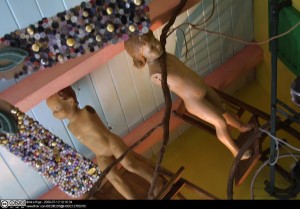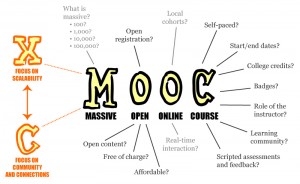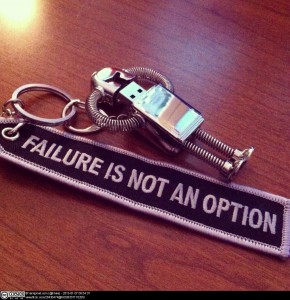…. over here.
Exciting times ahead
Newcastle University isn’t particularly known for its innovative work the open education arena – apart from the work I have been involved in through the #ukoer programme with colleagues from MEDEV which was focused on clinical education, any work that has gone on with open education and open practice has been in small pockets. Individuals ploughing their own furrow, without the support of institutional systems and processes.
I think we are starting to see a change.
In the past week I have had fascinating conversations with several members of academic staff here at Newcastle University, about how their experiences with MOOCs and/or OER is beginning to change how they think about their own campus based teaching.
I won’t name them or their subject areas yet, since I haven’t yet checked with them if they are happy for me to do that here, but I felt compelled to note my thoughts in a short post to remind me to go back and capture the transformative power of the work we are undertaking.
We haven’t even publicly announced out first course on the FutureLearn platform yet, and already people are telling me that their experiences with developing learning designs, thinking about content and stimulating discussion with course participants, or their experiences with doing a number of MOOCs, is changing how they think about their teaching and their students.
And I’m not talking about online teaching, blended or elearning here. I’m talking about academic staff who are thinking in fresh ways about their encounters with students on campus based programmes, about how they use their face to face time, and how to make best use of that time by thinking differently about content delivery.
Phrases like ‘making every second count’ and ‘getting to the essence of the message’ are cropping up and I have to say it is making our jobs in the FutureLearn Project Office rather interesting. I find it fascinating to see how conversations about learning and teaching with colleagues can have such an effect. Some are bravely putting themselves in the position of their students who roll up on day one of their undergraduate programme. By deciding to dip their toes in the waters of a subject they know little about and become novices, experiencing an online course through the eyes of the participant, academic colleagues are telling us that they are getting insight, and experiencing different approaches to teaching and encouraging learning. There seems to be genuine excitement about the possibilities opening up.
Newcastle University recently hosted the OER14 conference together with Leeds Metropolitan University at the Centre for Life, and 5 places were subsidised for non OER folks to go along. One of the conditions for taking up a free place for them was to write a blog post about what they thought about it and what they think they got out their attendance there. I can’t wait to read their thoughts, since the short exchanges I’ve had with those who attended were equally stimulating.
Exciting times ahead….
MOOCs at Newcastle are interesting….
So we are moving forward with the Newcastle MOOCventure swiftly. I had a nice email from a colleague at FutureLearn who said he liked our approach.
I’m not sure what that means, but for sure things are moving at a fast pace here. We had a good amount of interest internally when we asked for expressions of interest, and going down from 45 to 3 has been challenging. We still aren’t quite there yet, but have got our first title chosen, and will be starting work on designing and developing that one soon, with the others following soon after.
I am sure the process will be fascinating and I think we are in a privileged position in being able to take advantage of the increasing body of knowledge skills and experience across the UK HE sector, from those who have done it already, with FutureLearn, with other platform providers and independent adventures too.
I set up an internal mailing list so that we can communicate about both our own FutureLearn course development, and as a place to share related news from elsewhere, knowledge and expertise, and within an hour had 50 subscribers.
I’m under no illusion that my job over the next year is going to be a challenging one, but seeing how much interest there is in our institution is certainly helping with the early planning stages. And I am really valuing the discussions I am having with colleagues elsewhere.
2nd week in – how’s it going?
 In my second week of my new role here at Newcastle University and things are happening at breakneck speed. We are looking at flexible provision, part of which is the first project I am working on – signing up with FutureLearn. This initiative will enable us to start to have the conversations we need to when we consider what growing our flexible provision might mean.
In my second week of my new role here at Newcastle University and things are happening at breakneck speed. We are looking at flexible provision, part of which is the first project I am working on – signing up with FutureLearn. This initiative will enable us to start to have the conversations we need to when we consider what growing our flexible provision might mean.
My role over the next year as project manager of this development is to map current provision of online and distance programmes and identify opportunities there more generally, whilst delivering the commitment to FutureLearn over the next 9 months to a year.
I have relocated full time into our Quality in Learning and Teaching (QuILT) team, and whilst I am sad to be leaving working directly with technology enhanced learning in clinical education, I know I am ready for new challenges. The excitement (and some reticence) generated by the FutureLearn venture is tangible here, and I think represents a real appetite to extend our reach beyond the traditional campus based programmes we are known for.
I hope that much of what I have learned and been enthusiastic about in terms of open educational resources and all they entail, as well as my 13 years experience of encouraging TEL approaches with the old MEDEV Subject Centre will stand me in good stead as we examine where future opportunities might lie.
It’s going to be an interesting year.
Handing over ePortfolio
Over the past two weeks I have been handing over the ePortfolio project to the new Development Office in QuILT who has responsibility for it, Graeme Boxwell.
It’s been great fun setting up 32 implementation pilots over the past 5 months, and as the project really kicks in with a vengeance, it feels right to be handing it over at such an apposite point at the beginning of a new academic year.
Graeme will be great in his new role, and his enthusiasm for working with the pilots will, I am sure, be not only infectious, but stimulating to all involved. As the project moves towards full implementation across Newcastle University in 2014/15, these pilots will be key in that success.
The development team has been hard at work over the summer building in new features to help support personal tutoring within our homegrown ePortfolio, which will hopefully help support students in developing and refining their skills in reflection. A solid specification and prioritisation process was instrumental in helping us reach decisions on what to build and when, and has provided a model for future new feature processes, which Graeme will refine.
I wish Graeme good luck in his new role, and I hope the foundations I have laid in the past few months give him and the team something solid to build upon, underpinned with strong pedagogy informed technology from the development team in LTMS, without whom the eportfolio at Newcastle would not exist.
ePortfolio slides from Geography teaching awayday, 22 May 2013
Can be found via http://tinyurl.com/GPS-awayday-2013
I am sure there will be interesting questions, and I’ll attempt to summarise in an edit to this post later today.
Slides from eCopyright Executive Briefing at CILIP yesterday
Here are my slides from the session I did at the eCopyright Executive Briefing at CILIP in London on 9 May 2013.
I recommended everyone bookmark Xpert as the first place to start looking for Creative Commons licensed materials to use in learning and teaching.
Discombobulated
 Yesterday was a strange day. Working between two offices, two teams and two jobs is fairly confusing anyway, but yesterday I felt truly discombobulated. I didn’t know which day it was (long weekend due to Easter break), the time is still confusing (clock adjustment takes me ages), and I moved offices with one job. The MEDEV team is now physically integrated back into the School of Medical Sciences after a couple of years in a satellite building next door to a too conveniently located pub. We have moved from a 15 minute walk into town and a ten minute walk to the main campus, to a position in the Ridley 1 building which makes it much easier to get into town and around campus, but which gives us a walk up to the medical school, where much of the work of that School takes place.
Yesterday was a strange day. Working between two offices, two teams and two jobs is fairly confusing anyway, but yesterday I felt truly discombobulated. I didn’t know which day it was (long weekend due to Easter break), the time is still confusing (clock adjustment takes me ages), and I moved offices with one job. The MEDEV team is now physically integrated back into the School of Medical Sciences after a couple of years in a satellite building next door to a too conveniently located pub. We have moved from a 15 minute walk into town and a ten minute walk to the main campus, to a position in the Ridley 1 building which makes it much easier to get into town and around campus, but which gives us a walk up to the medical school, where much of the work of that School takes place.
I was struck by how much goes into making an office move happen. By how much goes on behind the scenes, how utterly disruptive it is, and how little thanks the people who actually make the move happen get, whilst experiencing high stress levels and dealing with being bombarded with questions. It struck many chords with how I feel about the work that both teams I currently work for do. Hidden. Behind the scenes. Often unglamourous, and disruptive, with few thanks and many questions. But nevertheless essential to the functioning of a modern university.
With that in mind I emailed the team who made the move happen to offer them my own personal Thank You.
OER13
I spent the past two days at the OER13 conference in Nottingham. I had a stimulating and busy couple of days, preparing a 20 minute presentation on joining up some technologies and workflows developed here as part of the funded projects under the now finished 3 year UKOER programme, funded via Jisc and the HEA. There were 48 mini chocolate cakes iced with ‘cc-by’ to give away as part of our cookbook themed talk (I presented along with my colleague James Outterside).
Additionally I was asked to facilitate a 45 minute discussion session on OER Experience. No mean feat when you are in a massive lecture theatre with people sitting in ones and two all over the place…. the conversation didn’t stop, and we had a lot of notes with some fascinating observations captured by Megan, which I blogged at the conference blog. Oh I was a conference blogger too.
All the cakes went. The presentation was exactly 20 minutes long. You can see our slides (with a LOT of links at the end) at the OER13 website.
I suspect there will be a lot of work in organising and taking part in the OER14 conference, since the co-chairs are Megan Quentin-Baxter and Simon Thomson (Leeds Met). I hope I can be involved and am already looking forward to next year’s event. Wherever it ends up being staged.
Now back to ePorfolios, online assessment and feedback (OLAF), research data management (iridium) and helping out a bit with some work around open access.
OER/open practice/openness/transparency never goes way, it just gets called different things…..
Walk the talk: brushing up on presentation skills for effective communication
 My job involves talking to people. It involves talking to people a lot. It has done for the past 11 years, really, and luckily I like talking to people.
My job involves talking to people. It involves talking to people a lot. It has done for the past 11 years, really, and luckily I like talking to people.
My job involves training, it involves persuasion, it involves rhetoric, narrative and storytelling, as I attempt to cajole people to think about changing their practice in learning and teaching, particularly with eLearning.
I use presentation skills a lot on a daily basis. I enjoy presenting, and I hope my style is generally interactive and genuinely motivational. Presentation skills can be used in one to one meetings, in small groups, in lectures, conferences etc. The skills are the same, but how we apply them in different situations differentiates what we do in any given situation.
Yesterday I was lucky enough to spend the afternoon with Michael Corbidge and Eamon (sorry I didn’t get his surname), voice coaches from the Voice and Text Department at the Royal Shakespeare Company. The session was organised by the Staff Development Unit here at Newcastle University. Michael and Eamon worked with a group of us to introduce tools and techniques to get mind and body prepared to speak publicly, and on ways to work with text to find new ways of getting meaning out of the words, to help us express and communicate the message more confidently and clearly. We worked on confidence, on being present in the moment, building those moments into a presentation, and linking them to gain momentum, and engage our audiences.
I found the afternoon fascinating.
I’ve always treated any form of public speaking or presentation as a performance. Whilst this can be scary and intimidating, it is always a chance to communicate your work (and to show off a bit). Communicating your work as best you can is an obligation of the funding we receive in higher education which allows us to do the work we do, in the institutions we do it in. I am constantly aware of how lucky I am to work in HE, of the privilege which goes in hand in hand with the responsibility I feel to use public money in the best way I can, as transparently as I can. Effective and efficient sharing and communication of ideas, outcomes and products of that public funding therefore goes hand in hand with doing the work. It isn’t an add on. It’s a fundamental part of the contract we enter into when we use public funds.
Keeping communication and presentation skills fresh and up to date is therefore, for me, an essential part of my personal and professional development. I am always looking for new ways into the content I am presenting, even if its a workshop I have delivered 50 times. I want the 51st workshop to feel as fresh, invigorating and interesting as the first. Everyone attending that workshop deserves to get as much out of it as the first people to attend.
If you have never thought about how you present yourself and your work publicly, I would urge you to go on a workshop like this. For many working in HE the techniques and tools you work with will feel alien and strange, but stick with it. I guarantee you will get a lot out of it, and so will your students, colleagues, funders and employers.
Learning to own the space you inhabit, to own the space you present in, to be present in the moment is fun and exciting, and will give you confidence and clarity in communicating your work and ideas. Even if you do get mistaken for a house manager from time to time.




